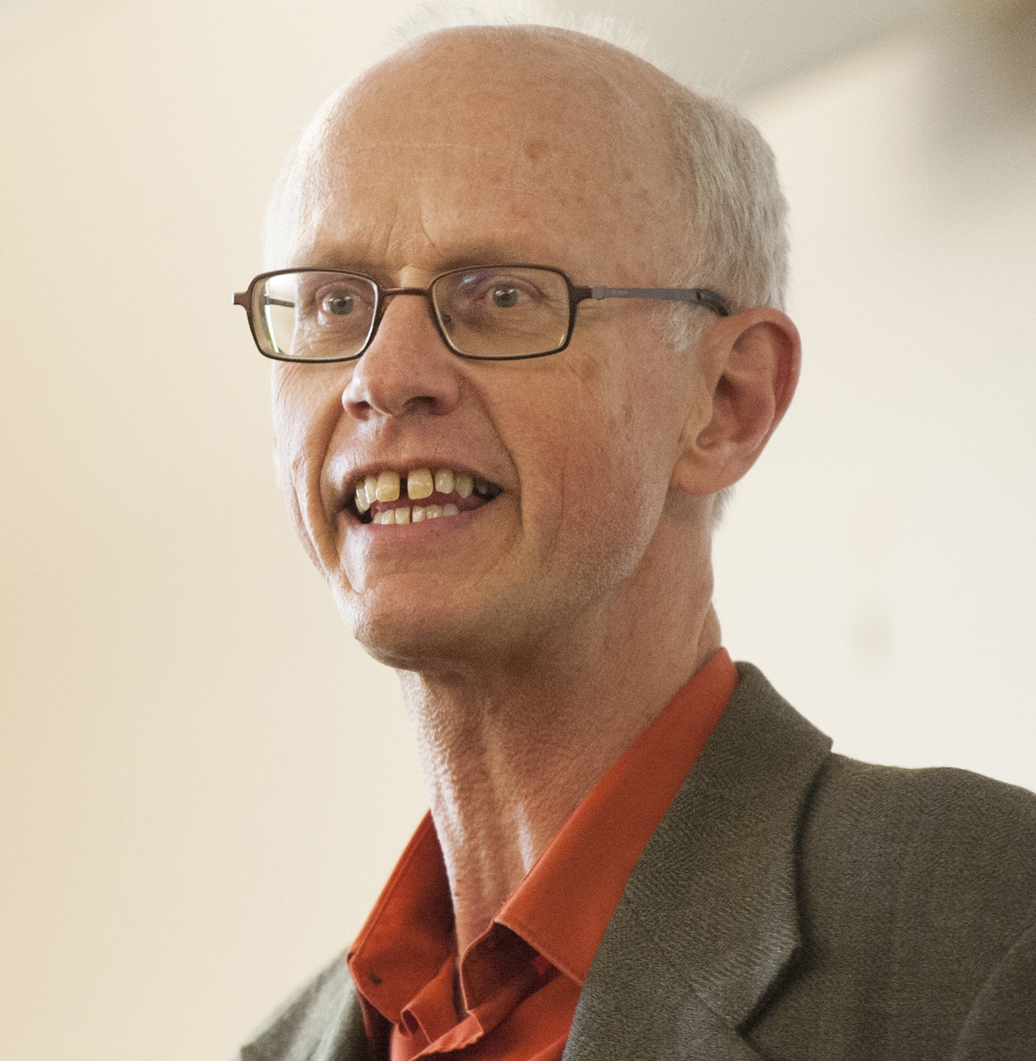The University of Iowa College of Liberal Arts and Sciences (CLAS) has named two professors as Collegiate Fellows, the college’s highest faculty honor, in recognition of their distinguished teaching, research, and service.
Karen Heimer, a professor in the Department of Sociology who is affiliated with the Department of Gender, Women’s, and Sexuality Studies, and Jonathan Wilcox, professor in the Department of English, will serve renewable five-year appointments as CLAS Collegiate Fellows.
"I am delighted to name Professor Heimer and Professor Wilcox as Collegiate Fellows," said CLAS Dean Chaden Djalali. "Through their teaching, mentorship, and research, they have served not only their departments, college, and university with distinction, but also their broader disciplines. On behalf of their students and colleagues, I congratulate them on their achievements and look forward to learning of many more in the years to come.”
 Karen Heimer is professor of Sociology and is affiliated with Gender, Women’s and Sexuality Studies and with the Public Policy Center at the University of Iowa. The 2018 President of the American Society of Criminology, Heimer conducts research and teaches in the areas of gender and violence, criminal punishment, and juvenile delinquency. Her current research focuses on gender and race differences in violent victimization; motherhood narratives of women in prison; gender and race differences in incarceration; and criminal punishment in the United States and in England. Heimer’s work has been supported by the National Science Foundation and National Institute of Justice. She is currently the University of Iowa Principle Investigator on a National Institute of Justice grant to implement and evaluate a trauma and violence intervention program in the Cedar Rapids schools, and she served on the National Academies of Sciences’ CNSTAT panel on Estimating the Incidence of Rape and Sexual Assault. In 2012, Heimer received the Distinguished Scholar Award from the Division on Women and Crime of the American Society of Criminology, and in 2015 was elected Fellow of that organization. She was recently awarded the 2018 Iowa Regents Award for Faculty Excellence.
Karen Heimer is professor of Sociology and is affiliated with Gender, Women’s and Sexuality Studies and with the Public Policy Center at the University of Iowa. The 2018 President of the American Society of Criminology, Heimer conducts research and teaches in the areas of gender and violence, criminal punishment, and juvenile delinquency. Her current research focuses on gender and race differences in violent victimization; motherhood narratives of women in prison; gender and race differences in incarceration; and criminal punishment in the United States and in England. Heimer’s work has been supported by the National Science Foundation and National Institute of Justice. She is currently the University of Iowa Principle Investigator on a National Institute of Justice grant to implement and evaluate a trauma and violence intervention program in the Cedar Rapids schools, and she served on the National Academies of Sciences’ CNSTAT panel on Estimating the Incidence of Rape and Sexual Assault. In 2012, Heimer received the Distinguished Scholar Award from the Division on Women and Crime of the American Society of Criminology, and in 2015 was elected Fellow of that organization. She was recently awarded the 2018 Iowa Regents Award for Faculty Excellence.
 Jonathan Wilcox is professor of English. Anglo-Saxon culture—the literature, language, and thought of early medieval England—lies at the heart of his professional activity. He teaches courses that introduce students to the language and literature of Anglo-Saxon England and explores aspects of that culture in his writing. One strand of his continuing research centers on uncovering the nature of Anglo-Saxon Christian culture, as in his book Ælfric's Prefaces (Durham, 1994); another strand centers on attention to manuscripts as a foundation for knowledge of the Anglo-Saxon intellectual world, as in his catalogue of Wulfstan Texts and Other Homiletic Materials (Tempe, 2000); while a third strand involves the broad investigation of gestures and emotions from the past, as in the edited collections Humour in Anglo-Saxon Literature (Cambridge, 2000) and Naked Before God: Uncovering the Body in Anglo-Saxon England (Morgantown, 2003). All three strands come together in a current project investigating the imagination of books, An Extreme Material Reading of the Word in Anglo-Saxon Culture. In addition, he is working on a book about Anglo-Saxon humor. Wilcox's involvement in the field internationally includes past editing of the Old English Newsletter and serving on the executive committee of the Modern Language Association and the International Society of Anglo-Saxonists. He teaches a range of medieval courses, particularly those that explore the literature of early medieval northwest Europe. In 2012, he was awarded the Iowa Regents Award for Faculty Excellence.
Jonathan Wilcox is professor of English. Anglo-Saxon culture—the literature, language, and thought of early medieval England—lies at the heart of his professional activity. He teaches courses that introduce students to the language and literature of Anglo-Saxon England and explores aspects of that culture in his writing. One strand of his continuing research centers on uncovering the nature of Anglo-Saxon Christian culture, as in his book Ælfric's Prefaces (Durham, 1994); another strand centers on attention to manuscripts as a foundation for knowledge of the Anglo-Saxon intellectual world, as in his catalogue of Wulfstan Texts and Other Homiletic Materials (Tempe, 2000); while a third strand involves the broad investigation of gestures and emotions from the past, as in the edited collections Humour in Anglo-Saxon Literature (Cambridge, 2000) and Naked Before God: Uncovering the Body in Anglo-Saxon England (Morgantown, 2003). All three strands come together in a current project investigating the imagination of books, An Extreme Material Reading of the Word in Anglo-Saxon Culture. In addition, he is working on a book about Anglo-Saxon humor. Wilcox's involvement in the field internationally includes past editing of the Old English Newsletter and serving on the executive committee of the Modern Language Association and the International Society of Anglo-Saxonists. He teaches a range of medieval courses, particularly those that explore the literature of early medieval northwest Europe. In 2012, he was awarded the Iowa Regents Award for Faculty Excellence.